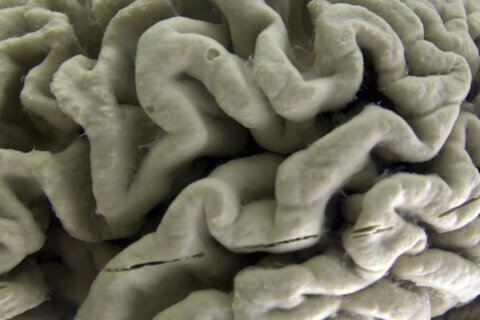The tonsils are a pair of glands in the back of the throat that help your body fight off viruses and other infections. Sometimes, your tonsils can develop tonsil stones — which are not usually serious, but can be annoying.
Also called tonsilloliths, tonsil stones are small lumps made up of debris, bacteria and particles from the mouth. They can form in the many crevices and valleys of the tonsils. Sometimes, you may not even know that you have them unless they start to cause symptoms. In a 2014 study, about 8% of the population had tonsil stones (the study group participants were between 9 to 87 years old).
Tonsil Stone Symptoms
Although not all tonsil stones cause symptoms, here are the symptoms that may occur when you have them:
— Bad breath.
— Coughing.
— Difficulty swallowing.
— Feeling as if something is stuck in your throat.
— Having a bad taste in your mouth.
— Having a sore throat.
— Seeing white or yellow spots on your tonsils.
— Spitting up white or yellow material. This could be a stone or part of one.
[See: 9 Habits That Are Killing Your Teeth]
Risk Factors for Tonsil Stones
There are risk factors that can make you more likely to form tonsil stones, including:
— Having tonsils with more crevices. In other words, there are more nooks and crannies where the stones can form, says Dr. David E. Melon, president of the North Carolina Society of Otolaryngology and the president of the Carolina Ear, Nose & Throat-Sinus and Allergy Center in Hickory.
— Being a teen. That’s because teens are more likely to have those crevices in their tonsils, says Dr. Ada Cooper, a spokesperson for the American Dental Association and a dentist in New York City. It’s normal to develop more crevices (also called crypts) in your tonsils as a teen, but those crevices tend to get smaller as you get older.
— Being a smoker, which can cause inflammation in your mouth and oral cavity.
— Having poor oral hygiene.
— Having recurrent tonsil infections. “When the tonsils get swollen, these pockets get deeper. That’s when stuff sticks around and doesn’t get out of there,” says Dr. Eric J. Kezirian, a professor of clinical otolaryngology and vice chair of the Caruso Department of Otolaryngology at Keck School of Medicine of USC in Los Angeles.
[SEE: Questions to Ask Your Orthodontist.]
How Tonsil Stones Are Diagnosed
Many times, tonsil stones just happen to be noticed by a dentist or an ear, nose and throat (ENT) doctor. They may see the stones during an oral cavity exam or during imaging of the head and neck. This can include a dental X-ray or CT scan.
It’s more common for the stones to be discovered incidentally during an exam rather than having imaging specifically to diagnose tonsil stones, says Dr. James Henri Clark, an assistant professor of otolaryngology – head and neck surgery with Johns Hopkins Medicine in Baltimore.
Sometimes, the symptoms of tonsil stones can mimic other health problems, such as a bacterial infection or strep throat. An ENT doctor can help confirm the diagnosis of tonsil stones.
[See: 6 Tips to Overcome Fears of Going to the Dentist.]
Treatment for Tonsil Stones
If tonsil stones aren’t causing any symptoms, then no treatment is needed, Melon says. The stones sometimes resolve on their own.
If the stones are causing mild symptoms, there are a few things you can do at home to help treat them:
— Gargle with room-temperature salt water for 30 seconds after meals. This can help both to dislodge stones and to relieve any pain you may have from them.
— Use a water flosser (also called a Waterpik) to help gently remove the tonsil stone.
It’s possible that you may end up unintentionally removing a stone through a strong cough.
Don’t try to remove a stone on your own with your finger or a toothbrush, Cooper cautions. This could cause damage to the delicate tissues of your tonsils. It’s better to see dentist or an ENT doctor who can gently dislodge a tonsil stone with an appropriate instrument.
In rare cases, tonsil stones may require a tonsillectomy, or removal of the tonsils. This is a more likely option if you get recurrent tonsil stones or tonsil infections. As an adult, tonsil removal is more painful, Clark says. That’s because adults have more buildup of scar tissue, making it harder to remove the tonsils. For this reason, a tonsillectomy is done only if absolutely needed.
If you have frequent tonsil stones that cause symptoms, talk to your dentist or ENT doctor about how to manage this problem going forward.
Preventing Tonsil Stones
You may not be able to prevent tonsil stones completely if you’re prone to them. Still, you can do a few things to reduce your chances of getting them:
— Maintain good oral hygiene, including regular brushing and flossing. Also, make sure to brush the front and the back of your tongue.
— See a dentist regularly, Cooper advises. For most people, that’s every six months. If you know you have a tonsil stone, you can often start with a dentist to help remove them, Cooper says. If the problem becomes more complex, the dentist will refer you to see an ENT doctor.
— If you smoke, stop. Smoking can cause inflammation in the throat and that can irritate your tonsils, Kezirian says.
More from U.S. News
Best Drinks to Boost the Immune System
The Best Vegetarian Slow Cooker Recipes
What Is the DASH Diet? Tips for Beginners from a Real Person
What Are Tonsil Stones and How Do They Affect Your Health? originally appeared on usnews.com
Update 10/25/22: This story was previously published at an earlier date and has been updated with new information.







